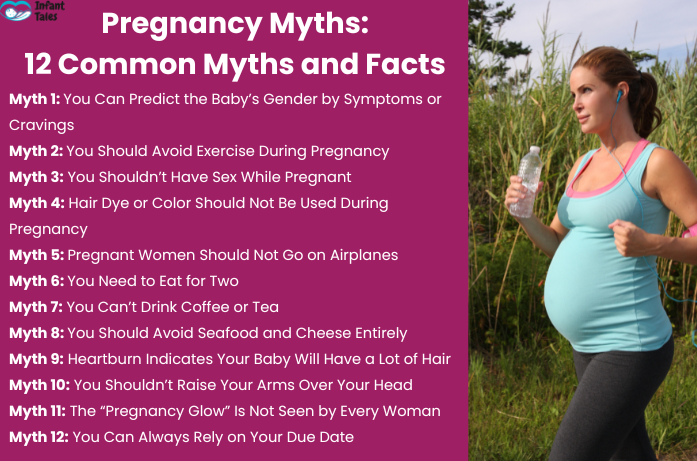By a Caring Mom at Infant Tales
Pregnancy is one of the life periods of women associated with many positive things such as the child’s birth, a multitude of expectations, and wrong advice, some of which may be Pregnancy myths passed on from one generation to another. For instance, one might question the fairness of mother’s food cravings determining the baby’s sex or Mother’s “eating for two” during her pregnancy. Actually, pregnancy myths may be so deceptive that they cover up all the loveliness of the process.
At Infant Tales we believe that the only way to be sure parents is to have the right information. Therefore, we will not only point out the differences between facts and myths but will also bring the truth about these so-called myths to light.
Myth 1: You Can Predict the Baby’s Gender by Symptoms or Cravings
You would come across these tales related to foods and cravings saying that if a woman is fond of sweets it indicates that a girl is coming and on the other hand if she prefers salty foods it implies that a boy is coming. Some people even think that the position of the baby – high or low – can tell the gender of the unborn child.
Fact: None of these are scientifically proven. Gender prediction myths are just that, myths. The only reliable ways to know your baby’s sex are through medical methods such as ultrasound (usually around 18–20 weeks) or genetic blood testing.
So, since guessing games are good, light-hearted guessing is allowed and keep the mystery alive until the day of the scan!
Myth 2: You Should Avoid Exercise During Pregnancy
You may have been told that if a pregnant woman exercises, she will suffer the consequences, but this is a totally wrong perception.
Fact: However, if the doctor does not prohibit it, exercising during pregnancy is healthy and even suggested. It promotes better blood flow, enhances mood, and may even make labor and recovery easier.
Light physical activities like walking, swimming, and prenatal yoga are excellent choices. If you were not physically active prior to pregnancy, it is good to start slowly and pay attention to your body’s response.
Reference: American College of Obstetricians and Gynecologists (ACOG)
Myth 3: You Shouldn’t Have Sex While Pregnant
As long as your medical provider doesn’t recommend any restrictions, Hetrick says it is perfectly safe to have sex while pregnant.
Fact: Sex with a male partner can also be beneficial because sperm contains the hormone prostaglandin, which helps the cervix soften to stimulate labor. As long as your water isn’t broken or your provider hasn’t told you that it is unsafe to have sex, you can safely have sex right up until the end of your pregnancy.
It’s normal for your sex drive to change during pregnancy due to hormonal shifts. Don’t stress, communication and comfort matter most.
Myth 4: Hair Dye or Color Should Not Be Used During Pregnancy
A very common question asked by women expecting a baby: “Is it safe to dye my hair?”
Fact: The majority of specialists hold the view that hair dye is safe during pregnancy, mainly in the latter half of the pregnancy. The constituents of hair dye are absorbed through the skin only in very small amounts, so small that they are not able to harm your baby.
Should you be dyeing your hair at home, make sure that the room is well-ventilated, use gloves, and always carry out a patch test first.
Reference: NHS – Hair Dye and Pregnancy
Myth 5: Pregnant Women Should Not Go on Airplanes
Flying is often associated with the risk of harming your baby but usually, it is safe.
Fact: Generally, flying is considered safe up to around 36 weeks of pregnancy provided that there are no health issues. It is always advisable to discuss your travel plans with your doctor and to check the policy of the airline as some may require a medical certificate after 28 weeks.
Pro Tip: Move around during the flight, stay hydrated, and wear comfortable shoes to avoid swelling.
Myth 6: You Need to Eat for Two
This is surely the most popular pregnancy saying ever and it is also one of the most misleading ones!
Fact: You are feeding your little one, but that does not mean it’s a time for two mouths to be served. The nutritionists say that only about 300 calories per day should be added to the total in the second and third trimesters. What is more important is to have foods rich in nutrients and the ones that will support both of you.
Whole grains, lean proteins, fruits, and vegetables should be your daily food intake and the “extra plate” should be reserved for family celebrations only.
Reference: ACOG – Nutrition During Pregnancy
Myth 7: You Can’t Drink Coffee or Tea
Good news, coffee addicts, you still can enjoy your morning cup.
Fact: Maternity caffeine consumption around 200 mg per day (one 12-ounce regular coffee) is mostly safe for pregnant women. Just be aware that caffeine is also present in tea, chocolate, and soda, so keep on accounting your total daily amount.
Myth 8: You Should Avoid Seafood and Cheese Entirely
This myth is based on real fears but is exaggerated.
Fact: Fish is a great fish source of omega-3 fatty acids which are very important for the baby’s brain development. You only need to pick properly: steer clear of high-mercury species like shark or swordfish, but have low-mercury fish species like salmon, sardines, and shrimp.
Similarly, soft cheeses are safe as long as they’re made from pasteurized milk or heated until steaming.
Myth 9: Heartburn Indicates Your Baby Will Have a Lot of Hair
It’s a hilarious old wives’ tale, and surprisingly, it’s still quite popular.
Fact: Heartburn is a side effect of pregnancy hormones which cause the muscles of your esophagus and stomach to relax, not the baby’s hair. Although one minor study reported a slight connection, it’s mostly coincidental.
So, reach for your antacids if needed, but don’t count on your baby coming out with a full head of hair!
Myth 10: You Shouldn’t Raise Your Arms Over Your Head
It’s a common myth that pregnant women should not reach too high or hang the laundry, for fear that the umbilical cord might get wrapped around the baby’s neck.
Fact: There is no scientific proof to back this up. The umbilical cords are mobile and sometimes get around the baby but this is a frequent and generally harmless situation. Reaching up won’t cause it.
Myth 11: The “Pregnancy Glow” Is Not Seen by Every Woman
People often talk about that beautiful “pregnancy glow.” While some truly shine, others may experience acne, tiredness, or mood swings instead.
Fact: For some women, hormonal changes can cause beautiful skin, while for others, the opposite can lead to skin problems. And, if you’re feeling emotionally drained, don’t think it’s rare; about 20% of expectant mothers experience or struggle with mood-related problems like anxiety or depression.
So don’t hesitate to consult your doctor or midwife for help; it’s just as important to take care of your mental health as your physical health.
Reference: NHS – Mental Health in Pregnancy
Myth 12: You Can Always Rely on Your Due Date
Every pregnant woman marks her due date on the calendar but the fact is that it is just an approximation.
Fact: Only approximately 5% of babies are born on their due date. Most first-time mothers give birth a little bit later. Your due date is a pointer and not a final date, so make your hospital bag ready early and remain open to changes.
Bonus Myth: Morning Sickness Only Happens in the Morning
If you have ever experienced nausea throughout the day, then you are already aware of the wrongness of this one.
Fact: “Morning sickness” can occur anytime, whether during the day or at night. It is hormonal fluctuations that are mainly responsible for it, especially the increasing levels of hCG. Most women enjoy some relief after the first three months, but some might experience it for longer.
If vomiting is so excessive that it prevents you from drinking water or receiving the necessary fluids, consult your doctor, as it might be hyperemesis gravidarum, a condition that calls for medical attention.
Final Thoughts
Pregnancy myths are ubiquitous, being passed on from one person to another, and from social media to family, but if you know the truth it will be easier for you to make decisions that are calm and confident.
Follow your instincts, be aware of your body, and make use of scientifically proven information and professional advice. Each pregnancy is different so don’t measure yourself against others.
FAQs About Pregnancy Myths
1. Can cravings or bump shape really tell the baby’s gender?
It’s a no-no because only ultrasound or blood tests can give an accurate answer regarding your baby’s gender.
2. Is exercising safe during pregnancy?
Yes, light to moderate workouts like walking or yoga are safe unless your doctor advises otherwise.
3. Should pregnant women eat for two?
No, you require only about 300 more calories daily in the last trimesters.
4. Can I dye my hair while pregnant?
Yes, it is usually safe after the first trimester in a well-ventilated area.
5. Does heartburn indicate my baby has hair?
Heartburn is caused by hormones, so not really; it’s just the hair growth that’s not your baby’s.
Empower your journey to motherhood with knowledge and care.
Visit Infant Tales for more expert pregnancy and parenting resources you can truly trust.
Disclaimer: This article aims to provide information and is not a substitute for professional medical advice. For any questions or concerns, always talk to your healthcare provider.



